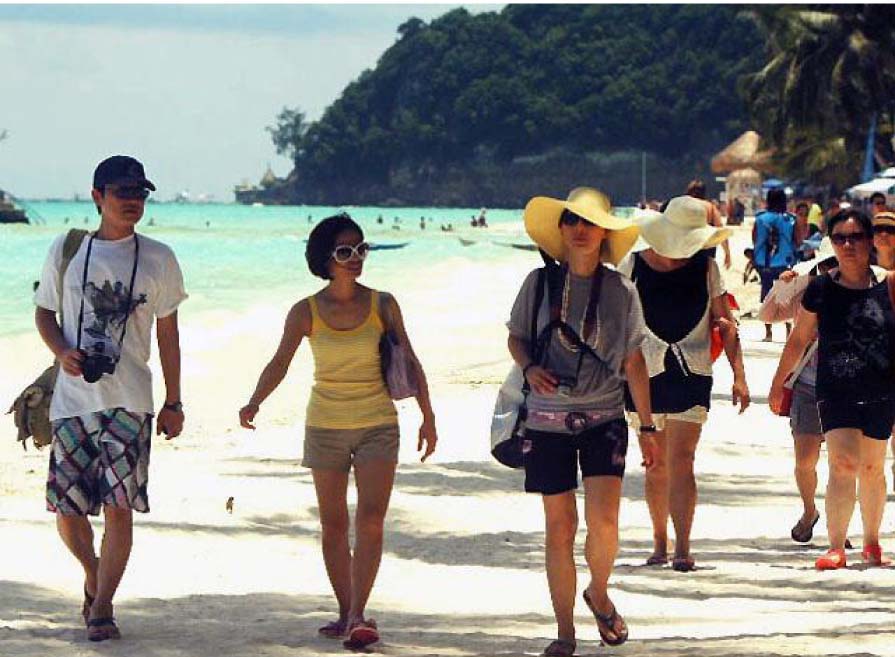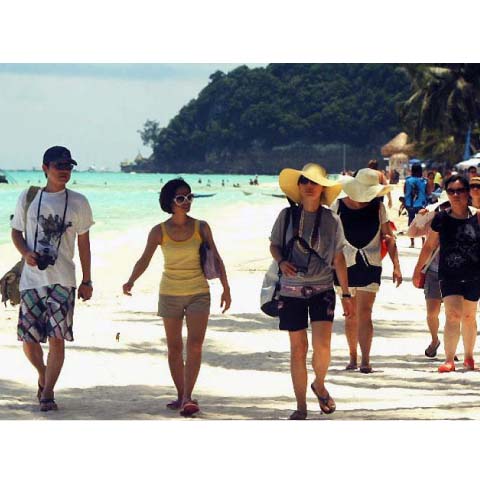
A man was enjoying a quiet meal in a Manila restaurant when two Chinese men entered boisterously, smoking their cigarettes.
The security guard tried to tell them smoking was prohibited on the premises, but was rudely told it was none of his business.
The diner stood up and requested the shorter of the two newcomers to please tone down his voice. The taller one belligerently demanded he settle the issue with him instead, but the diner retorted that he wasn’t talking to him. The taller Chinese man continued to insist.
Suddenly, punches started flying: the diner had thrown the first punch. The other man tried to offer money for the diner to stop, but he just replied, “I don’t need your money, have respect in my country!”
Soon afterward, police came to escort out the two Chinese from the restaurant.
The story, posted on Facebook, was greeted with cheers from nationalistic netizens.
Social media hot button
Although many differed on their assessment of the situation, there is no denying that the subject of Chinese mainlanders’ uncouth behavior has become a hot button issue on social media.
And it’s not just in the Philippines, but other countries as well, especially when it comes to travel. On various online posts and comments sections on social media sites, Filipinos overwhelmingly repudiate the bizarre actions that mainland Chinese tourists or migrants do in public.
Often, people are confused. Questions such as “Why are there so many in our country?” “Why are they behaving like this here?” “We follow their rules when we go abroad; why don’t they follow ours?” abound. People would comment about their own personal experiences regarding mainland Chinese.
The most dominant and furious comments are related to the West Philippine Sea/South China Sea dispute. A lot talk about China’s inappropriate behavior. There are some who believe that the Chinese are out for “conquest” or “invasion.”
All these comments are coupled with opinions of the government’s perceived inaction and its inability to resolve the island dispute which Filipinos believe rightfully belongs to the Philippines while, at the same time, it welcomes Chinese investment and development aid.
Fighting back
Such comments further fuel violent and belligerent outpourings, stoking Filipinos’ desire to fight back. In such a turbulent international climate, Filipinos want someone to stand up against the Chinese.
Hence, many have commented that by standing up to these unruly and ill-mannered people from the mainland, they stand up to China as a whole.
In fact, I have read that some have aggressively confronted Chinese nationals, whether because they have abused a dutiful security guard, store clerk, or themselves. By putting these Chinese nationals in their place, it would feel like much-deserved payback.
Social media viewers brand this as nationalistic pride, and cheer on the individuals who fight back. There are many stories in social media where Filipinos recount such unpleasant interactions with them.
They feel that these Chinese behaved very rudely, such as cutting in line or taking their shirts off in public. Many say the Philippines is their country, so there is no need to tolerate or accept foreigners’ rude behaviors.
Aside from shocked and scandalized feelings generated from such outrageous behavior, it makes Filipinos feel disrespected, leading to low morale, especially as this is happening in their own country.
Being treated as second class citizens in their own country is a main factor that triggers the Filipino’s nationalistic fervor. Coupled with the resentment from a perceived powerlessness, they counterattack. By advocating nationalism, they believe they are protecting their own country, thus winning back respect.
The political relationship of the Philippines and China is widely discussed in social media as well. There is a general feeling of being affronted and of being “invaded” because, while the Filipinos welcome the Chinese to their friendly shores, China reciprocates by infringing on the Philippines’ islands.
Nationalistic fervor is inevitably heightened by such perceived acts of aggressive trespassing. This nationalistic fervor however, is not the same nationalistic sentiment as evinced in Europe or in the United States.
There, the blame is put squarely upon immigrants, especially those from a completely different cultural or religious background, such as the Muslims. The unfortunate immigrants are considered “undesirables” or worse, branded as terrorists, and there are persistent calls for a ban against their entry into one’s country.
In the Philippines, there are calls for much needed labor and immigration reforms due to the high influx of Chinese. But there are no movements or demands for a complete ban either on immigration or on Chinese tourists visiting the country.
Separate issues: tourists, island dispute
Furthermore, the issue of the islands in the WPS/SCS is a government-to-government issue. Clumping the territorial island dispute with the Chinese government together with the concern over increased influx of Chinese nationals – which are two different issues – does not help clarify the discourse of each topic.
Despite some Filipinos feeling that they have to tolerate the rude behaviors or attitudes of the Chinese, it does not mean having to change our own behaviors or social set-up.
Sadly, there are many aggressive comments that perpetuate the stereotypical perception: that all Chinese from the Mainland are the same. Others resort to racist comments, such as using ching-chong/ching-chang to refer to Chinese nationals.
But the real issue here, as some of the more perceptive social media users observed, is not about race. Rather, it is about manners and showing respect.
There is nothing wrong with loving one’s country. While there is truth to the many stories of mainland Chinese behaving rudely or inappropriately, confrontational behavior will only result in greater anger, and the Filipino reputation of patient tolerance becomes the true victim.
The large influx of Chinese into our country tests us. But we need to bear in mind that the increasing number of Chinese tourists, who now have the means to travel abroad, is inevitable.
According to a 2017 Nielsen report, 131 million Chinese tourists traveled overseas.
When it comes to understanding how this travel affects the country, it is best not to think of this as an “invasion” or “conquest.” The Chinese nationals are here for a myriad of reasons. But mostly, they travel for leisure.
Education, respect for law
Analysts have pointed out that they behave as they do because leisure travel only became widespread in the 1980s. Many middle-aged or older tourists, especially those from the rural areas, were deprived of education. They do not know the rules of air travel, nor how to behave in another country, nor that they need to respect other cultures.
This should not be a question of whether we should be tolerant or how tolerant we should be to tourists or people of other nationalities and their attitudes. We must be tolerant, period.
On the institutional level, it is a question of what the institutions can do to further safeguard and spread the value of tolerance and understanding to both Chinese and Filipinos. By doing so, it will help people change how they deal with unpleasant situations, and not resort to aggressiveness.
Overwhelming numbers of Chinese tourists, or indeed, of tourists from any country, can be daunting for any establishment if there is no proper management from our tourism industry or from the government. Local governments and government tourism agencies can work together, promote marketing campaigns to steer the influx of tourists to different parts of the Philippines, especially to the lesser known places.
As for the Chinese government, they are already aware of their traveling citizens’ many misdemeanors. They have promulgated various measures, such as The Guidebook for Civilized Tourism, and conducted pre-travel classes to better inform their people of dos and don’ts when visiting other countries.
In 2015, the government began blacklisting serious offenders. Those blacklisted for misbehavior and other offenses face various consequences that include being denied access to better seats on trains, travel on railways, boarding an aircraft, and losing travel privileges entirely for months or years, the duration of which is determined by the seriousness of the offense.
Lastly, on our side, a shift in attitude and understanding is necessary. The Chinese, just like tourists from other countries, are willing to learn if such information is brought to them properly and in a timely manner. Understanding things from their point of view is really the first step to alleviating this situation, or punches will not stop flying.
